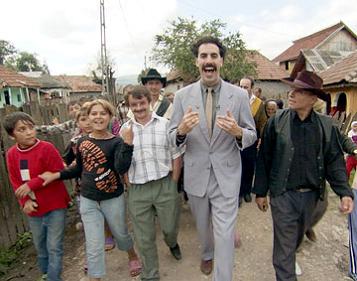

One of the stranger films in recent memory is the long-winded Borat: Cultural Learnings of America for Make Benefit Glorious Nation of Kazakhstan, a hybrid of fiction and reality, where scenes and dialogue are improvised with real people who aren't in on the joke. Borat is one of the guises of British comedian Sacha Baron Cohen (Talladega Nights, Madagascar), who shot to fame with Da Ali G Show. In it, Cohen interviews unsuspecting guests, sometimes pretty well known people, in the guise of Ali G. Borat is a Kazakh reporter who is crude, fascinated with sex, and flippantly anti-Semitic. Needless to say, this film is not for the faint of heart.
The most amusing aspect of all of this is the actual Kazakh government doesn't appreciate the joke, and hired publicists to counter the claims. At one point they were close to alleging that Cohen was working for rival governments trying to defame Kazakhstan. Well, this only serves to drum up additional free publicity. The hard part about Borat is wondering why, after a successful run on cable, is he still so unknown? He still manages to con people like Bob Barr and Alan Keyes into sitting down for interviews, even though he's punk'd many politicians in the past.
The story is credited to Cohen, Peter Baynham, Anthony Hines, Todd Phllips (School for Scoundrels, Starsky & Hutch), with a script credited to Cohen, Baynham, and Mazer. Direction credit goes to Larry Charles (Masked and Anonymous). A "script" is a bit of a misnomer, since Borat plays more like reality television. There is an outline of a story, typically Borat acting bizarrely in an otherwise normal situation. Cohen goes into the situation, and interacts with the person, or people, some of which may be in on the joke. The cameras roll, and hopefully the reaction to Cohen is funny. Cohen himself leaves the audience in stitches with some of his far out ideas, especially concerning the role of women and the evils of the Jews.
And sometimes, the results are riotously funny. The premise of the film is that Borat is a Kazakh television personality. The Kazakh government sends him to America to report on what Kazakhstan can learn from Americans. Once here, Borat falls in love with Pamela Anderson, and vows to travel across the country to meet her. Cohen takes a dump in a planter on a busy New York street. He tells feminists that women have small brains and should not deserve education. Borat takes driving lessons and pulls out some vodka to drink while driving. Borat works because while it is essentially a series of small skits, there is a coherent plot moving the story forward. And while it can get extremely funny, it gets a little old after a while. Borat loses steam near the end, only because it has been firing on all cylinders for most of time before.